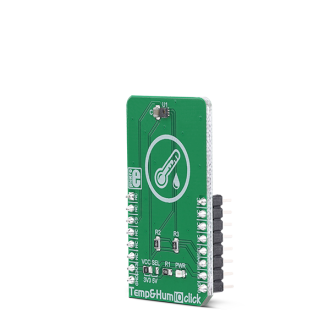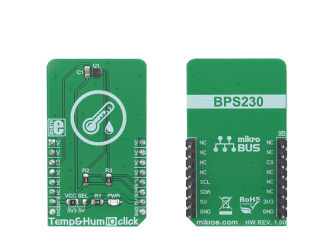
We strongly encourage users to use Package manager for sharing their code on Libstock website, because it boosts your efficiency and leaves the end user with no room for error. [more info]

Rating:
Author: MIKROE
Last Updated: 2019-02-20
Package Version: 1.0.0.0
mikroSDK Library: 1.0.0.0
Category: Temperature & humidity
Downloaded: 4543 times
Not followed.
License: MIT license
Temp-Hum 10 Click is a smart temperature and humidity sensing Click board, aimed towards IoT applications, due to its extremely small size and very low power consumption.
Do you want to subscribe in order to receive notifications regarding "Temp-Hum 10 click" changes.
Do you want to unsubscribe in order to stop receiving notifications regarding "Temp-Hum 10 click" changes.
Do you want to report abuse regarding "Temp-Hum 10 click".


Library Description
The library initializes and defines the I2C bus driver and drivers that offer a choice for writing data in register and reads data form register. The library includes function for read Temperature and Relative Huminidy data and function for set device mode. The user also has the function for repeat measurement.
Key functions:
float temphum10_getHumidity() - Functions for read Relative Huminidy data.float temphum10_getTemperature() - Functions for read Temperature datavoid temphum10_repeatMeasurement(uint8_t average) - Functions for repeat measurement.Examples description
The application is composed of the three sections :
void applicationTask()
{
temphum10_repeatMeasurement(_TEMPHUM10_AM_TIMES_AVERAGE_MODE_2 | _TEMPHUM10_AM_TEMP_AVERAGE_MODE_TIMES_16);
Temperature = temphum10_getTemperature();
Humidity = temphum10_getHumidity();
FloatToStr(Temperature, demoText);
mikrobus_logWrite(" Temperature : ", _LOG_TEXT);
mikrobus_logWrite(demoText, _LOG_LINE);
FloatToStr(Humidity, demoText);
mikrobus_logWrite(" Humidity : ", _LOG_TEXT);
mikrobus_logWrite(demoText, _LOG_LINE);
mikrobus_logWrite("---------------------", _LOG_LINE);
Delay_1sec();
}
Other mikroE Libraries used in the example:
I2CUARTConversionsAdditional notes and informations
Depending on the development board you are using, you may need USB UART click, USB UART 2 click or RS232 click to connect to your PC, for development systems with no UART to USB interface available on the board. The terminal available in all MikroElektronika compilers, or any other terminal application of your choice, can be used to read the message.